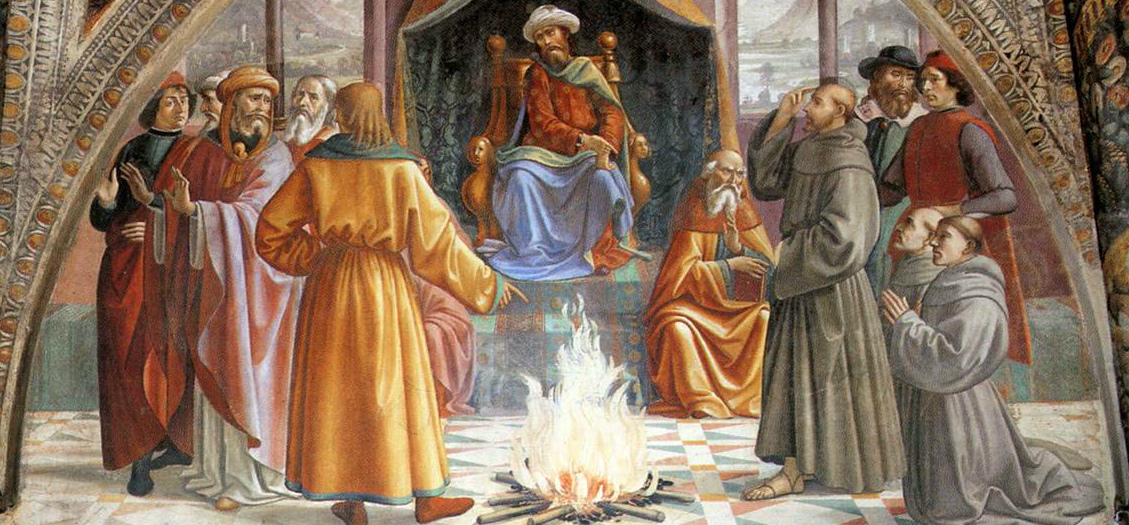
The saint of the day for May 30th is the courageous warrior Saint Joan of Arc, French national heroine, who was born in Domremy, France, 1412 and died in Rouen, France, 1431.
At the age of 13, Joan began to hear the voices of Saints Michael the Archangel, Margaret of Antioch, and Catherine of Alexandria, telling her that she had been chosen to free her country from the English. Joan’s apparitions instructed her to find the true king of France and help him reclaim his throne. She resisted for more than three years, but finally went to Charles VII in Chinon and told him of her visions.
After overcoming opposition from churchmen and courtiers, she was given a small army with which she raised the siege of Orleans on May 8, 1429. Carrying a banner that read “Jesus, Mary”, she led the troops into battle.
She followed the famous campaign of the Loire during which the English were decisively beaten, and Charles was crowned at Rheims, on July 17, 1429. When she was captured by the Burgundians during the defense of Compiegne, Joan was sold to the English for 10 thousand francs. She was then put on trial by an ecclesiastical court conducted by Cauchon, Bishop of Beauvais, a tool of the English. Although she astounded her judges by her answers, she was condemned to death as a heretic, and burned at the stake on May 30. In 1456, her case was re-tried, and Joan was acquitted (23 years too late). She was canonized by Pope Benedict XV in 1920.
Joan’s heroic virtues were plentiful. She was trustful of God, courageous in battle, benevolent in victory, and merciful toward those who betrayed her.
St. Joan of Arc is the patroness of: France, martyrs, prisoners, people ridiculed for their piety, rape victims, soldiers, Women’s Army Corps, WAVES (Women Appointed for Voluntary Emergency Service).
Saint Quote
“About Jesus Christ and the Church, I simply know they’re just one thing, and we shouldn’t complicate the matter.” ~ Joan of Arc, as recorded at her trial
Prayer of St. Joan of Arc For Healing
Composed by Andrea Oefinger
Holy Saint Joan, compassionate to the sick and wounded, who, while on earth, nursed so many back to health, hear me.
You who wished to see no one injured or in discomfort, pray for me and guide me through this difficult time.
Daughter of God, wounded many times in battle, I petition you for healing (here mention your request here) so that I may be better able to serve God in whatever capacity HE wishes. Intercede for me.
It may not be in God’s will for my body to be healed, for my sufferings may help another or my own soul. If my request is not granted, help me to remain strong, and instead be healed emotionally and spiritually. Amen.
Prayer of St. Joan of Arc For Healing
Composed by Andrea Oefinger
Holy Saint Joan, compassionate to the sick and wounded, who, while on earth, nursed so many back to health, hear me.
You who wished to see no one injured or in discomfort, pray for me and guide me through this difficult time.
Daughter of God, wounded many times in battle, I petition you for healing (here mention your request here) so that I may be better able to serve God in whatever capacity HE wishes. Intercede for me.
It may not be in God’s will for my body to be healed, for my sufferings may help another or my own soul. If my request is not granted, help me to remain strong, and instead be healed emotionally and spiritually. Amen.
To Joan of Arc – By St. Therese of Lisieux
When God, the Lord of hosts gave you the victory,
You drove the strangers out, made crowned your monarch, too.
Then, Joan, your name became renowned in history.
Our greatest conquerors all pale compared with you.
A fleeting glory, though! You needed to possess
That aureole, a saint’s which never can grow dim,
Your Love held out to you His cup of bitterness,
You drank; and humankind rejected you, like Him.
For, in a lightless cell, weighed down by heavy chains,
There then were rained on you the strangers’ cruel jeers.
No friend of yours was found to share with you your pains.
None was there to step forth and wipe away your tears.
That darkness in your jail more radiance projects
Than did the Crowning, when such high acclaim you got!
The luster you have now, in glory, it reflects:
What was it brought it you? Betrayal – that is what.
If God had not, from love unto His Passion come
And in this vale of tears sought death, betrayal, thus,
Our suffering would then have been so burdensome!…
Yet now we love it: for it’s treasure now for us.
– Via Collected Poems of St. Therese of Lisieux, Translated by Ann Bancroft, (Zondervan, 1996)

Source: http://www.jeanmheimann.com/2017/05/saint-...oness-soldiers/


 May 30 2017, 02:02 PM
May 30 2017, 02:02 PM
 Quote
Quote













 0.0327sec
0.0327sec
 0.56
0.56
 6 queries
6 queries
 GZIP Disabled
GZIP Disabled